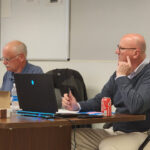
LIMESTONE, Maine — What began as a small research project at the Loring Commerce Center in Limestone has the potential to bring internet and cell phone service to rural areas around the world.
Altaeros, a Boston-based startup consisting primarily of MIT graduates, rented space at the former Air Force Base last year, where researchers spent months testing a tethered aerostat, or airship, equipped to provide the transmission capability of up to 30 cell towers, according to company officials.
According to a press release shared during a Feb. 21 Loring Development Authority meeting, Altaeros CEO and CTO Ben Glass “said it was gratifying to see [the aerostat] delivering streaming video at broadband speeds.”
The aerostat resembles a blimp, and “floats at heights up to eight times higher than the typical cell tower,” according to the release, and is also designed to withstand “almost any weather conditions, including small hurricanes.” The tethered balloon is connected with power and data to the ground and has the potential to provide 5G service to an area of up to 6,214 square miles, depending on the terrain, according to the firm’s researchers..
LDA President and CEO Carl Flora played a video created by the startup during the meeting, which outlined the aerostat’s potential to bring internet access to remote locations across the world, and featured numerous shots of the device being tested in Limestone.
After showing the video, Flora introduced Limestone Economic Development Coordinator Dennis McCartney, who spoke about Loring’s possible role in Altaeros’ future endeavors.
McCartney said he has pitched the idea of developing aerostats for the company at Loring, and distributing them from here.
“This aerostat could replace 30 cell towers,” McCartney said, “and in terms of geography it could cover from Houlton to Fort Kent and provide internet and cell service to those areas.”
While McCartney has only been in rural Maine for eight months, he said he’s “been here enough to know how terrible the cell service can be,” and that he’s currently working on developing a formal proposal to Altaeros with the intent of building aerostats on the former Air Force base.
“The plan is to build at Loring, store them here, and distribute them across the world,” he said. “You could land a C-130 cargo plane here and put a deflated aerostat inside.”
The economic development coordinator said that not only could this provide cell service to rural areas in need, but it could help in the aftermath of natural disasters.
“This could come in handy on the Virgin Islands or Puerto Rico,” said McCartney, “One [aerostat] could cover the Virgin Islands and maybe one or two could cover Puerto Rico.”
According to McCartney, Altaeros has “discovered a way to develop an omnidirectional transmitter” that could essentially deliver a signal to northern Maine without crossing over to the Canadian border.
He concluded by saying this is one of many things he and others are working on to “support Loring and create more jobs for the region.”
Flora thanked McCartney, and pointed out that while, none of these prospects have proceeded to the point where they’re going to be “built tomorrow,” they “all do reflect possibilities.”







